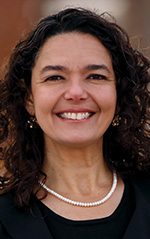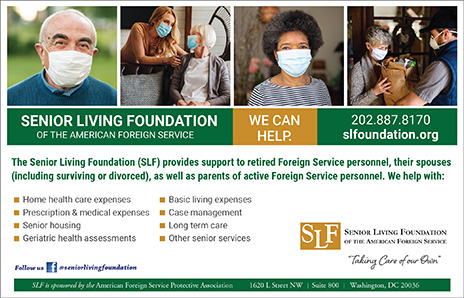In-Person Exchanges, Interrupted
Some virtual components have proved helpful, but the face-to-face experience—the heart and soul of an exchange program—is irreplaceable.
BY DEENA MANSOUR
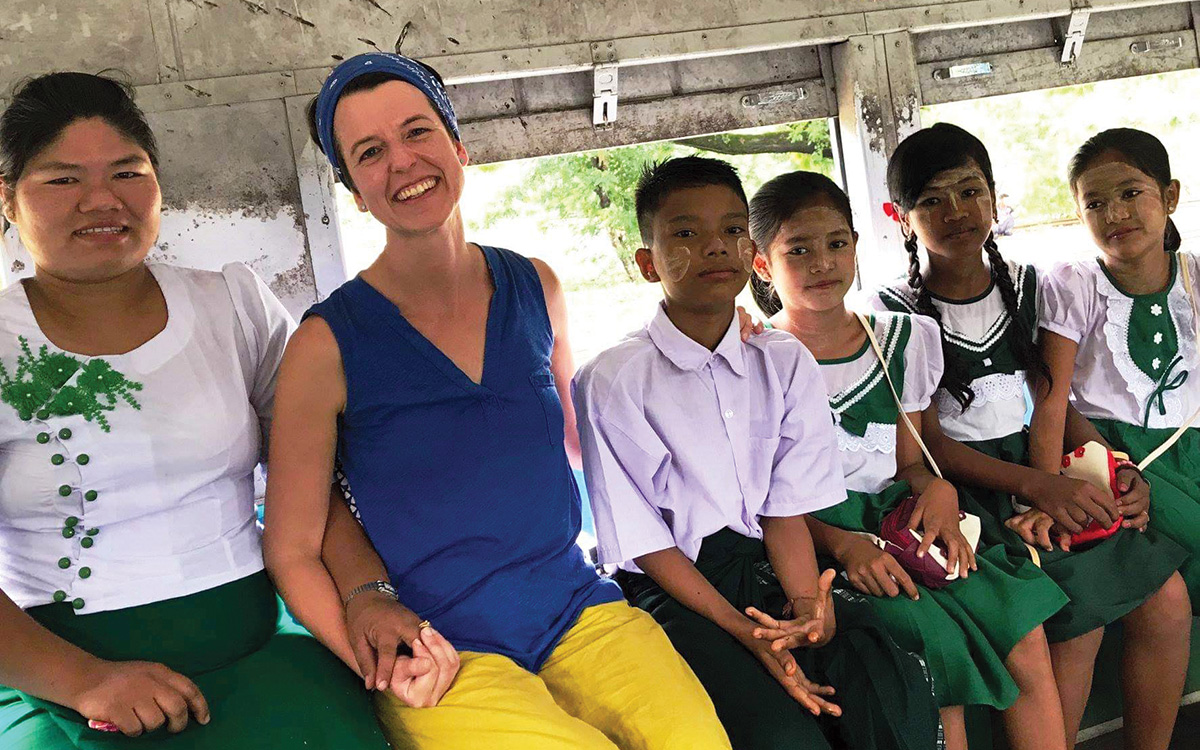
The in-person experience is the heart and soul of exchange programs. Montanan Jenny Eck, second from left, with friends made in Myanmar during a Professional Fellows Program there in October 2018.
Courtesy of the Mansfield Center
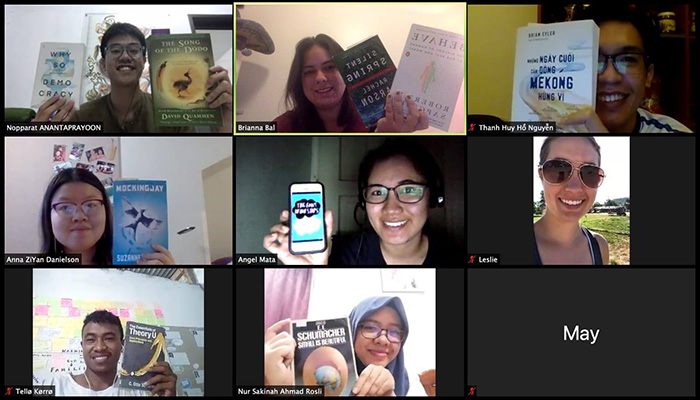
2020 YSEALI Academic Fellows share their favorite books during the first stage of their experience, reframed as a virtual exchange.
Courtesy of the Mansfield Center
Kitih’kanamtsimatsinoh’poowaa anoom Siksikatsitapii sah’koyii (Welcome to the Blackfeet Reservation). … Gathered around the campfire in the chill of a Montana night, 20 young fellows listen as a Blackfeet elder shares the tribe’s creation story. The fellows are participants in the Young Southeast Asian Leaders academic fellowship sponsored by the U.S. Department of State. Selected by embassies at posts across Southeast Asia, they traveled thousands of miles for their first experience in the United States.
After a day of hiking along the Continental Divide, the “Backbone of the World,” they swap stories, sing American pop songs and sample s’mores. Their academic director, affectionately referred to as Dr. Len, is a global expert on transboundary environmental studies. He provides context for the next day’s lessons before they retire to their tipis, sharing confidences late into the night.
This was what an exchange looked like in the pre-COVID world, before the disruption began. The next day, the group would journey to the Badger-Two Medicine wilderness, where young Blackfeet mother Kendall Elmo tells the story of how the U.S. government leased the area to oil companies for $1 per acre without environmental review or consulting the Blackfeet Nation.
Elmo describes how the tribe partnered with diverse stakeholders to oppose the leases, reinforcing the importance of building coalitions over time. These lessons ring true to the students, many of whom have firsthand knowledge of dislocation in the face of dams, deforestation and mining in their own countries.
Virtual exchanges allowed us to set the stage for the students’ U.S. experience by developing relationships while at the same time introducing foundational concepts.
The young people are united in their assessment that the exchange has been life-changing. They are forever affected by their time immersed in experiential learning, living with host families and developing friendships across borders. Ongoing evaluations demonstrate that participants in these exchanges develop a better understanding of the United States and acquire tangible skills with which to empower their own communities.
Such experiences are the heart and soul of exchanges. No matter how sophisticated the platform or how carefully crafted the content, electronic engagement cannot take the place of lessons learned under the Big Sky, along the bayous of Louisiana or in the halls of the U.S. Congress.
But as we’ve also learned over the past year, there are ways to adapt to disruption that have introduced economies and assets to exchanges that will last beyond the pandemic.
Coming to Terms with Disruption
Virtual Engagement Lessons Learned
• Identify a facilitator who can set the desired tone and be a constant throughout multiple sessions, set an agenda, create checklists for such items as breakout session participants, and have tech support available.
• Provide all accessible presentations and handouts in advance.
• Acknowledge the challenges of unstable internet connections. Sharing recorded session transcripts allows participants to review and reinforce session material.
• For participants with disabilities, the presenter should describe all images and text, utilizing the chat box to provide any description that might be missed.
• Start the meeting by establishing rapport and sharing meeting objectives and ground rules regarding respect, active listening, patience and questions.
• Use icebreakers to help reduce anxiety. Facilitate something simple, as superficial prompts can build to something deeper. Ask participants to describe one thing they’re passionate about, the view from their window or a favorite local dish.
• When people are vulnerable, others open up. Create a safe space for sharing while managing oversharing. Consider setting a timer, and have a plan to reconnect with emotional participants one-on-one.
• To support nascent English speakers, screen-share or type instructions into the chat box.
• Make time for reflection at the end of each session, either verbally or in the chat box, with a simple prompt asking for one takeaway.
—DM
Flying back to Montana from Jakarta on Jan. 19, 2020, I transited Seoul’s Incheon Airport the same day a traveler brought the novel coronavirus to South Korea. (My colleagues looked at me with alarm every time they heard my hacking, post-trip cough, as I nervously assured them that I was not Montana’s Patient Zero.) Despite this personal glimpse of the pandemic, I naively believed that the virus would be contained, and that we would soon host our next State Department exchange: academic fellows in the Young Southeast Asian Leaders Initiative (known by its acronym, YSEALI). As weeks passed, we frantically booked and rebooked tickets as the pandemic forced us to avoid transit through critical hubs in China, then Korea, then Japan.
Eventually, it dawned on us that our constant rerouting was in vain: There was no way our fellows would make it; and even if they did, it would be to a world shut down. Their U.S. experience would then be nothing more than the view out a dorm window with no visits to Glacier National Park, the Flathead Indian Reservation, or even down the street to sample steak and eggs at the Oxford Tavern—where new keys were being made because until COVID-19, the doors at the Ox hadn’t been locked since 1883.
Here at the University of Montana’s Maureen and Mike Mansfield Center our mission is to foster globally minded leaders of integrity. This is a challenge in a state that ranks near the bottom in every assessment of internationalization, such as the number of persons who speak a second language, engage in international commercial partnerships or study abroad. The Mansfield Center—founded by Congress in 1983 to honor the legacy of Mike Mansfield, our country’s longest-serving Senate majority leader and U.S. ambassador to Japan under Presidents Jimmy Carter and Ronald Reagan—supports K-12 and higher education across the state in both civic education and international engagement with speakers, conferences, workshops, classes, research and dialogs.
Exchanges are among the most important things we do. They offer a unique window into the United States through rural Montana while supporting an underserved population with opportunities to develop their skills so that they can better engage in a globalized world. Exchange participants can be just about any age, depending on the program. YSEALI has two age groups: 18-24 and 25-35. The State Department Bureau of Educational and Cultural Affairs’ programs range from high school through adult professionals. Educational and cultural exchanges generally seek to develop cultural understanding and a grasp of thematic content between U.S. citizens and citizens of other countries.
Going Virtual
Assuaging the YSEALI students’ disappointment, we (again, naively) told them that we hoped to see them in August. Then we embarked on reframing the first stage of their experience as a virtual exchange to make connections in both real-time and asynchronously.
There are some advantages in this: virtual engagement is cost-effective, and it has the capacity to reach far greater numbers of participants. As noted by a Tohoku University virtual exchange student, this method also empowers less assertive participants to gain confidence in language and engagement behind the barrier of a screen.
Virtual exchanges allowed us to set the stage for the students’ U.S. experience by developing relationships while at the same time introducing foundational concepts. We facilitated camaraderie through icebreakers, movie nights and birthday celebrations. Our faculty led academic discussions on U.S. society, government and civic engagement. Experts joined us to talk about the pandemic and U.S. elections.
To keep the fellows engaged online, it was important that they take the lead in discussions and become an integral part of their learning. They introduced best practices of youth leadership, comparing techniques across borders. The fellows supported one another’s work, including campaigns for flood and pandemic relief.
Connecting Counterparts
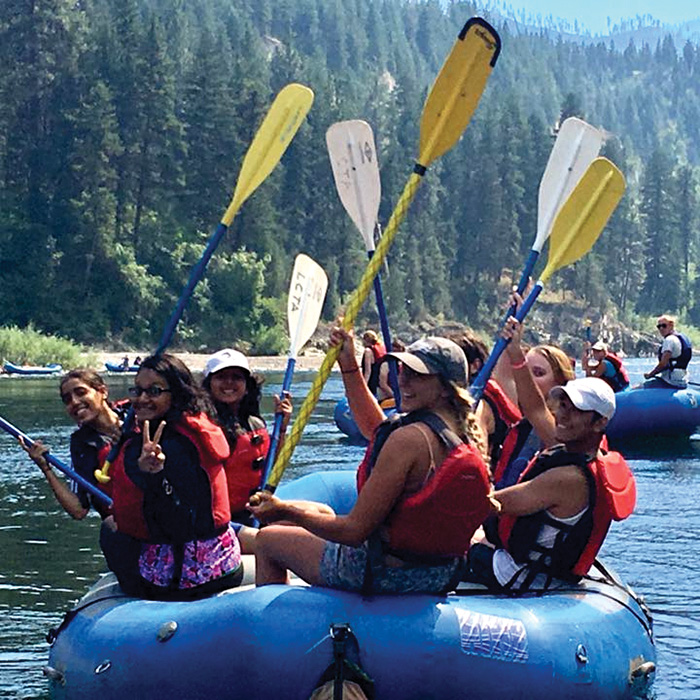
Exchange participants raft Montana’s Clark Fork River in July 2018.
Courtesy of the Mansfield Center
Beyond academic content, we tried to preserve the most critical aspect of exchanges: the connection with U.S. counterparts. We developed the Global Peers Across Lands Sharing (PALS) Program to pair University of Montana students with YSEALI fellows. UM students responded with applications to PALS to build cross-cultural communication skills, virtual engagement competencies and leadership. For UM student McKenna Jones, the experience replaced her study abroad: “I had been on an exchange in Austria when COVID-19 hit hard. It was disappointing being forced to come back early; but being able to connect with my Thai partner, May, and share our cultures went a long way to making that loss of opportunity bearable.”
To supplement synchronous engagement by Zoom, WhatsApp and social media, we facilitated use of two asynchronous platforms. FlipGrid allowed participants to create and share short videos about their interests, hobbies and dreams. The UM course instruction hub, Moodle, housed readings and conversation prompts.
There have been unforeseen benefits of the move to virtual exchange. Participants have bonded over sharing the struggles of COVID-19, and the number of friendships developed exceeded our expectations. As UM student Ahna Fox notes: “I didn’t think I would get a friend out of this experience. I saw academic gain, a positive for my résumé and an eye-opener involving culture. All this proved to be true, yet I gained so much more. The things that I didn’t expect to find are the things that I find the most rewarding.”
Despite the benefits, participants were united in expressing their desire for experiential learning and face-to-face interactions. As one YSEALI fellow notes: “It makes me want to end COVID-19 and visit Montana already. My PAL and I have a list of activities we will do together when I get there such as mountaineering, baking and biking.”
Spontaneous Connections Lost
Similar sentiments were expressed by participants in the YSEALI Professional Fellows Program, which is centered on a monthlong fellowship in a U.S. workplace. A reciprocal exchange, participants then host their American partners to implement an action plan.
Fellow Mathilda Ho founded a nongovernmental organization to lead Singapore’s first volunteer movement to promote the dignified treatment of refugees and displaced persons. While her April 2020 exchange was postponed, she and her cohort met for online training and small-group work. Mathilda notes: “We were able to bond over common struggles, hopes and aspirations in our areas of work, to better our communities and the people we serve. This is the spirit that is missing and something very much needed in today’s fragmented world.”
One of the most powerful elements of in-person exchanges are the spontaneous connections that happen through people-to-people relationships.
While Mathilda and her cohort await a rescheduled U.S. program, it is important to note that one of the most powerful elements of in-person exchanges are the spontaneous connections that happen through people-to-people relationships. Take 2018 Vietnamese alumna Nguyen Thi Van: During her fellowship in Montana, her American partner realized Van could be much more comfortable in her wheelchair with a sheepskin seat cover—something commonly used in the United States. That opened Van’s world to numerous low-cost adaptive technologies that were not available in Vietnam. Now, with the assistance of her U.S. fellowship host and a small program grant, Van is developing a showroom in Hanoi where people with physical disabilities can obtain simple modifications that facilitate mobility and comfort.
No virtual platform can deliver such effects—experiences that lead to innovations in the fellows’ work, which then have a ripple effect throughout their communities.
U.S. Communities: Capital Lost
The transition to virtual exchanges has also tangibly disrupted some U.S. communities. The loss of hundreds of millions of grant dollars has had a significant economic impact on Main Street businesses. Citizen diplomacy, broadly speaking, is known for developing five forms of capital: knowledge, cultural, social, civic and economic. With the cessation of in-person exchanges, opportunities for Americans to become informed about international affairs, develop cross-cultural communication skills and prepare to engage in international commerce are fewer (especially in isolated Montana). Virtual exchanges cannot fill the gap.
Rachel Carroll Rivas, co-director of the Montana Human Rights Network, had planned to travel to Thailand in June to assist her fellowship partner, Rojana Inkhong, in connecting the national government’s human rights agency to local stakeholders. This collaboration would have supported Rojana’s work to strengthen citizen participation in human rights at a critical time. While the contribution of U.S. participant knowledge to YSEALI communities is important, equally significant is the transformation of the American participants who become citizen ambassadors on their return home. In rural Montana, these community leaders play a critical role in shifting perspectives.
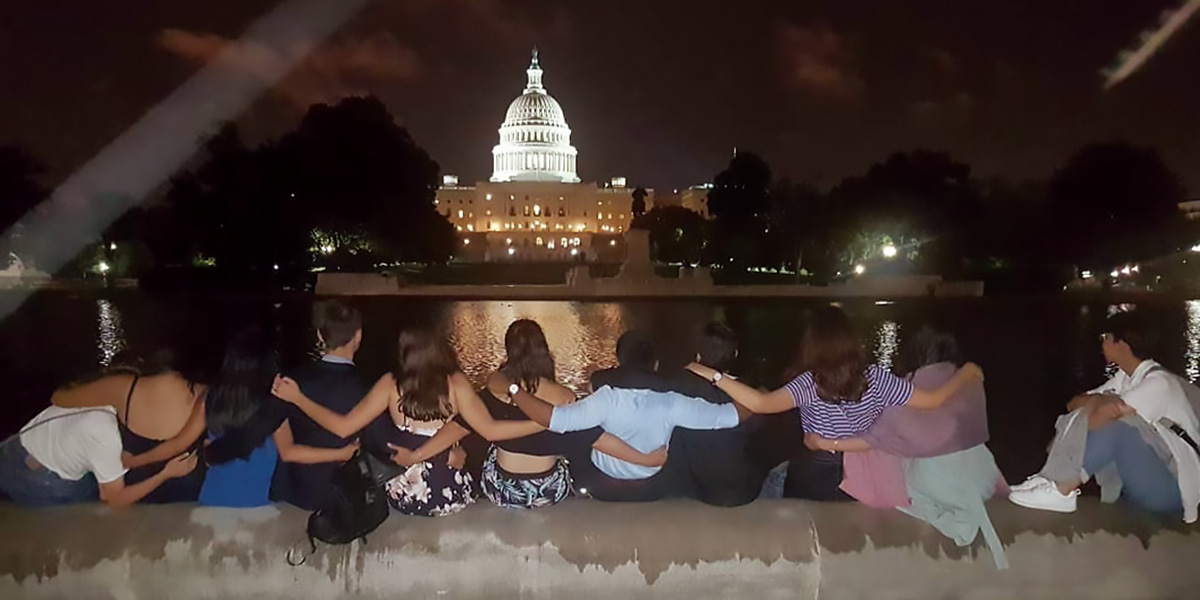
Exchange participants say farewell on the last program night in Washington, D.C., in July 2018.
Courtesy of the Mansfield Center
The Future of Exchange
The importance of experiential learning has been proven, ironically, by the absence of in-person exchanges for the past year, and this should inspire a growth in exchange programming under the new administration. At the same time, we have learned the benefits of some virtual components that will continue to enhance the exchange experience. A new high school exchange with U.S. Embassy Hanoi, conceived of by Public Affairs Officer Pam DeVolder to celebrate the 25th anniversary of normalized relations between the United States and Vietnam, provides the ideal combination of program activities.
Cohorts of 25 Vietnamese and 25 American students will first engage virtually for six months. Then Vietnamese students will travel to the United States for two weeks to work with American students, who will follow that with travel to Vietnam to support community action projects. Ongoing program impacts will be maximized by continuing virtual engagement between the two groups.
DeVolder notes: “The past year has shown just how valuable virtual engagement can be. Hybrid programs, like the one we’re planning with the University of Montana, are really the future model for exchanges, fostering deep cross-cultural connections and meaningful projects that will benefit entire communities for years to come.” This expanded engagement through virtual platforms simply wouldn’t have happened without the lessons of COVID-19.
We can only hope that participants in our delayed exchanges will eventually make it to the United States to build on the relationships and learning already begun virtually. As Macon Barrow, chief of the Bureau of Educational and Cultural Affairs’ Study of the U.S. Branch, states: “Virtual exchange programs are a good substitute for in-person programming during a pandemic and an enhancement to these in-person exchanges. However, the in-person experience is the heart and soul of these exchange programs to the United States, and that experience is irreplaceable.”
Read More...
- “Virtual Sports Visitor Program Connects Coaches and Administrators from Ten Countries,” by U.S. Department of State, February 22, 2021
- “Exchange Programs Pay Off for Americans,” by Marie Royce, The Foreign Service Journal, May 2019
- “Soft Power, High Impact,” by Robert Zimmerman, The Foreign Service Journal, December 2015

